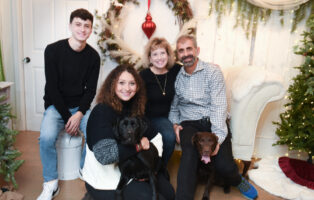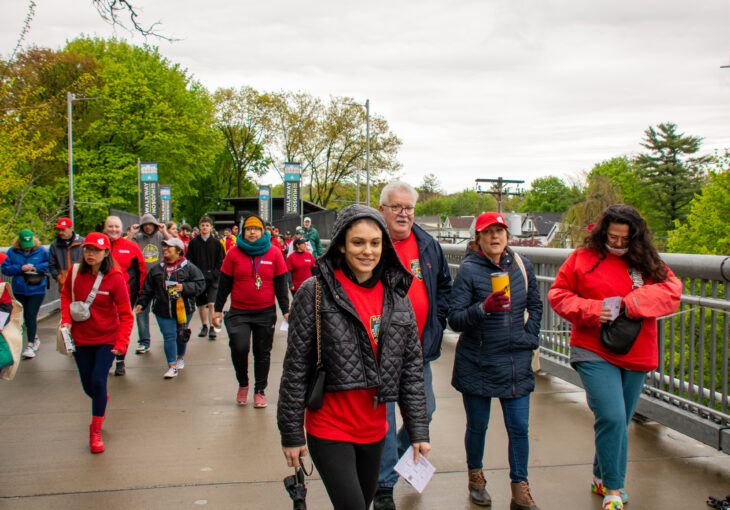
Karina Gonzabay of Ellenville

Mary Jo Cipollini, second from right, her son and daughter Tommy and Ally, and her husband Joe and dog Stella.
In 2016, Mary Jo Cipollini of Highland, N.Y., didn’t miss any of her son Tommy’s baseball games – including one on the day that she had her second cardiac arrest.
“I came home to change, and got really dizzy,” Cipollini said. “I woke up on the bathroom floor and didn’t know how I had gotten there or how much time had elapsed. I asked my husband if he had heard something drop, and he said he hadn’t. This was Tommy’s time – it was the Highland/Marlboro game and he was the second baseman. He was so happy; I wasn’t going to ruin that.”
Two weeks later, Cipollini was at a doctor’s appointment, and told her doctor she “might have passed out.” When he checked her defibrillator’s history, it showed that she had received a shock on the day of the game.
“The nurse practitioner came in, and told me it proved that I had a working defibrillator,” Cipollini said. “If I’d been home and hadn’t had that device, I might not be here.”
The sudden cardiac arrest that led to Cipollini receiving a defibrillator happened when she was 36, in 2002, and her children were 6 and 2.
“I was without oxygen for 10 to 12 minutes,” Cipollini said. “Twenty-two years later, here I am, brain-injured, but not brain damaged.”
There was no reason Cipollini should have had a cardiac arrest. “I didn’t smoke, I didn’t drink, there was no family history of heart disease,” she said. “I brought this to the family.”
Cipollini has been an advocate with the American Heart Association and other organizations for 22 years, speaking at events, working with Rotary International to place AEDs around the community, and advocating in Albany and Washington, D.C., for legislation to save lives.
On Saturday, April 27, she’ll share her story on the Highland side of the Walkway Over the Hudson.
Because she survived sudden cardiac arrest, Cipollini savors the things she’s been able to do.
“My daughter’s Frist Communion was pretty emotional,” she said. “And then I think about all the milestones – eighth-grade graduation, high school, seeing my children settle into their dorms, being here when my parents were sick. For a while, I couldn’t lift my 2-year-old. When I could, I’d say, ‘Mommy picks you up because…’ and he’d say, ‘Because she can.’”
“I’ve been given a gift,” Cipollini said, explaining why she’ll share her story at the Hudson Valley Heart Walk. “I’ve got to pay it forward.”
Karina Gonzabay
As a child in Ecuador, Karina Gonzabay was very active. She danced in local festivals, rode her bike everywhere, and it wasn’t unusual that she’d run a marathon and come in second.
After moving to the Hudson Valley in 1998, Gonzabay always had jobs that required physical activity, waitressing at events in hotels, working in retail, and eventually getting a license to work as a phlebotomist. She took a night shift as a patient care tech to make it fit with her life as a single mother of two. She frequently worked seven days a week, even after her children were born.
Over time, she began to experience dizziness, shortness of breath, palpitations and even chest pains. Frequent tests – including wearing a heart monitor and having a loop monitor inserted – didn’t show anything. She was even advised to stop working the night shift at the hospital in favor of a day shift. It didn’t help.
“I began to worry that it was all in my head,” Gonzabay said.
After Gonzabay asked to have her loop recorder removed, in March 2022, doctors diagnosed her with an anomalous coronary artery – her right artery was on the left side – something she was born with.
“After living with this for 42 years, there was suddenly a rush for me to have surgery,” Gonzabay said. After going through several doctors and hospitals, Dr. Emile Bacha at Columbia Presbyterian operated on Gonzabay in October 2022. While repairing the arteries, he also discovered a PFO, a hole between the left and right upper chambers of the heart. Everyone is born with a PFO, but unlike most, Gonzabay’s hadn’t closed.
Gonzabay was out of work until August 2023. She now works per diem as a nursing assistant and on the cleaning staff. She’s 44, and her children are 20 and 9. She sees her cardiologist every six months, and still gets a little short of breath when climbing stairs or doing laundry.
“I’m still working to get back on my feet and provide for my family, as I always did,” Gonzabay, who lives in Ellenville, said. “I’m recovering to my fullest to get as close to ‘back to normal’ as possible. I’m also very grateful to have overcome this huge obstacle in my life.”
Cipollini and Gonzabay will share their stories at the Hudson Valley Heart Walk, which takes place on both sides of the Walkway Over the Hudson on April 27. Opening remarks will take place at 9 a.m., followed by the walk over the bridge and back again. Participants can register at Heart.org/hudsonvalleyheartwalk.
